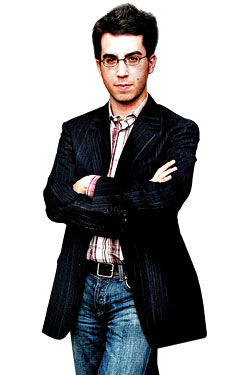
Jonathan Safran Foer, his dog George, and I were planning to go for a walk in Red Hook to talk about meat. But it’s a miserable, maritime, mist-and-cold-rain morning, and so Foer and I are hunkered down on the covered patio outside of Fairway and George is sleeping in the car. Which is just as well, since I want to start by asking Foer about the section in his new book, Eating Animals, which is titled “A Case for Eating Dogs.”
Foer isn’t making an actual case for eating dogs; rather, he’s making a Swiftian argument for eating dogs as a way of making the larger argument that we shouldn’t eat animals at all. Maybe. Eating Animals is, in part, a persuasive polemic against cruelly mechanistic factory farms, intertwined with a less-satisfying tango with a more contentious question: Is eating animals ethically wrong? On this question, he never quite lands, in the book or in person. He writes things such as “Why doesn’t a horny person have as strong a claim to raping an animal as a hungry one does to confining, killing, and eating it?” yet says to me, “I’m not against meat, philosophically,” and later, “I don’t know if I think it’s wrong. And I wrote a whole book about it.”
Foer is no hard-line vegan warrior. Instead, his book is driven by a dismay with big agribusiness and its ecological impacts. And as he sees it, because all of the commercially available meat in America comes from factory farms, the thornier ethical questions are moot. “I don’t think those ideas matter too much in terms of the actions we take every day.”
Also thorny: This is Jonathan Safran Foer talking. He’s not a farmer, nor a nutritionist, but rather a very successful young novelist, the author of Everything Is Illuminated and Extremely Loud and Incredibly Close, and one of the more celebrated residents of Park Slope. Which is to say that, by denouncing the meat-industrial complex from a notoriously Michael Pollan–Fast Food Nation–locavore-friendly encampment, he risks coming off as the embodiment of a particular cliché: The ethical urban dilettante. But he’s not fazed by this suggestion.
“I don’t think that if people knew that this is far and away the number-one cause of global warming, they would say it’s a dilettante issue,” he says. “If someone saw a person in front of them doing to an animal what they do on these farms, they wouldn’t say it’s a dilettante issue.” And how would he answer someone like Anthony Bourdain, who once wrote that “vegetarians are the enemy of everything good and decent in the human spirit?” Well, as it happens, Foer just appeared with Bourdain on Larry King Live. “We were backstage in the greenroom and he was saying factory farming is the worst blight in America right now,” says Foer. “In fact, I’d say he agreed with everything in my book. Then we get on the show and he says he thinks humans are designed to eat stupid little animals. Now, that annoys me. I find that disappointing—that his shtick is much more important to him than what he knows to be right.”
The rain has let up—slightly— so we get into Foer’s Subaru Outback, wake up George, and head to a nearby pier to give her a quick walk. Earlier I’d asked Foer an obvious question—why is his female dog named George?—and he’d explained that he and his wife, novelist Nicole Krauss, found George as a puppy, abandoned in Greenwood Cemetery, the same week that George Plimpton died. Plimpton published Foer’s first piece, so he named his dog in Plimpton’s honor. “I actually wrote a little letter to Plimpton’s widow,” he says. “I don’t think she liked it or thought it was funny. Or kind. Or anything. Then again, she’s never met my dog.”
Loosed from her leash, George, a beautiful Labrador-ish mutt, tears off down the pier to chase a rat. “George! George! No! No!” shouts Foer—less worried, I think, that George might snuff out this living creature than that she’ll catch some rat-borne disease. Thankfully, the rat escapes. “I don’t think she wanted to eat it,” Foer says. “I think she just wanted to kill it. Though I’m not sure if that’s a meaningful distinction.”
Have good intel? Send tips to intel@nymag.com.